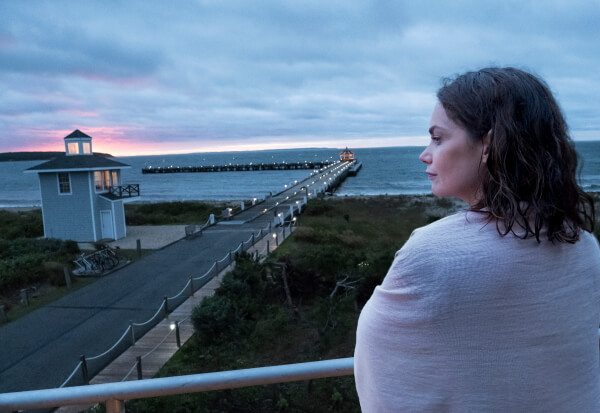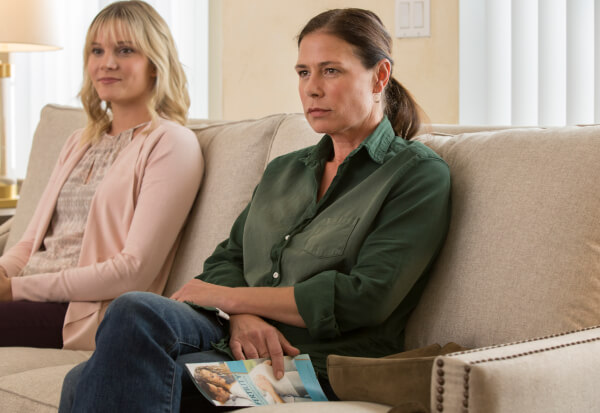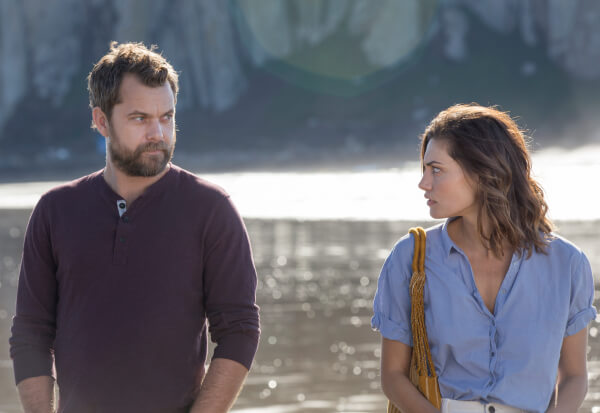The other day—Saturday, August 4, to be exact—a Facebook thread went absolutely electric with dozens of literate versions of OMG!!! comments about the next night’s episode of The Affair. A few writers had caught an early version of the episode for their work, and though they didn’t want to spoil it for the rest of us, they were jumping out of their skins with news of an astonishing plot twist in the unique Showtime melodrama that is now in the third to last episode of season four.
We know the two lead female characters—we’ve had them in our lives.
I could barely wait for Sunday night, and now, having seen it, I can report that the twist—the death of a major character (in a way preordained by the show’s histrionic Fiona Apple theme song)—was as breathtaking as they’d warned us. But what I find equally astonishing is how a TV show—one that is basically a soap opera, chic attire or not—can so completely mezmerize women of our age, many of us who have busy lives and careers that we should be tending to rather than on social media picking apart the motivations and schemes of these flawed characters and trying to predict what could possibly happen next.
And then I realized: It is precisely the soap-opera aspect of the show—the improbable plot lurches, the mayhem, the pathos, the mystery, and the sex!—that we’ve all secretly known is part of the pull. What Peyton Place was to our mothers in a primmer TV age, The Affair is to many of us today.

Brooding, self-destructive Alison (Ruth Wilson) by the beach.
But it’s not just any soap opera. We know the two lead female characters—we’ve had them in our lives. Alison is the involuntary brooder; the sensual, dignified sad girl who has been marked by heartache—some the result of circumstance, some temperamental and innate. Every man falls for her, but bad luck follows her, and her melancholic smile can properly be called “soulful.” Helen is the entitled, stylish, practical, cool near-socialite; the girl we were a little intimidated by in college; the girl who, if badly messed with, would always find a way to “come back” from that experience, often with the help of “getting” a man.
But these female characters are far more complex than their basic “types” —and after so many decades of getting stock women characters, especially stock older women characters, it’s nice to find a Helen. She is played by 53-year-old Maura Tierney with beautiful nuance and visible wrinkles around her eyes. (Ruth Wilson, as Alison, is equally wonderfully complicated.)
The Back Story

Helen (Maura Tierney) sitting in a fertility clinic waiting room.
For those who don’t know the show, it’s full of envy-inducing, geography-porn “aspirational” settings (the Hamptons, Brooklyn Heights, the canyons of Beverly Hills), and, true to classic melodrama, it gins up, to nearly Dreiser proportions, a social-class-divide premise, especially in the first two seasons. When we first meet them, Alison and her husband, Cole (Joshua Jackson), are working-class residents of Montauk, on the tip of the Hamptons; resentful of the wealthy weekenders on the patch of beach their families have lived and toiled on for generations. (This tough, provincial “towny” quality fades a bit as the seasons pass.)
And when we first get to know Helen, a slightly dilettantish graduate of Williams, she is summering with her wealthy, snobbish parents in a huge estate on ocean’s edge, taking a break from her own Brooklyn brownstone. Helen is spoiled and cheerfully blasé, but she is increasingly multifaceted as the seasons pass and as unexpected heartbreak comes into her life. The owner of a chic little gift store, she has four children with her one-time working-class (but you’d never know it) school-teacher husband Noah Solloway (Dominic West). Noah resents the haughty manipulations of his life that come with his in-laws’ wealth. His spontaneous, passionate affair with Alison, a waitress, breaks up his marriage to Helen—he wants out, right away!—shocking Helen to her core and making her seem deeply vulnerable to us.
We are allowed to relish the women’s ambiguity, their complex humanity, and their modest footprint in the outside world.
But if we hate Noah for leaving Helen, and hate him even more for then becoming a famous writer, we sure see the penance he’s paying when he voluntarily lies and takes the rap and the resulting three-year prison sentence for an accidental hit-and-run committed by an inebriated Helen.
Later, when she has a new, madly devoted man in her life, a dreamboat younger doctor (the Helens of the world get those guys) who wants a baby with her even though she’s in perimenopause with a brood of kids, we feel for Helen. We admire her as she sits in the ob-gyn’s office next to a bubbly young fellow fertility patient who could be her daughter and maintains both dignity and irony when she tells the nurse her date of birth. And we smile at her—this annoyed, conceited New Yorker—when she verbally cuts down to size the ridiculous newer-than-New-Age sexy, nosy female neighbor who invites her to a spiritual weekend. (There are two sex scenes with this wacky young woman—but, hey!, it’s a modern soap opera; what do you expect?)
Yin and Yang

Cole (Joshua Jackson) and Alison.
Helen is charismatic, and she is disciplined. She uses her natural entitlement and her responsibility – four children!—to be commanding, and most of her decisions (as opposed to those of pathos-laden, instinctively self-destructive Alison) are self-protective and staunchly upper middle class. She is by turns tough and vulnerable, in control and impulsive, and always fiercely proud. She’s like that soignee friend you’ve known for years—the one beyond your glamour bandwith. The one who, every time you have your yearly lunch date with her, you come away a bit blown away at her casually mentioned adventures, because, midlife or not, she quietly refuses to have a quiet life.
Says Pamela Redmond Satran, whose novel Younger (about a woman in her forties who pretends to be in her 20s in order to get a job in the New Economy) has been a cable TV hit for five years: “Helen is a great character even though she’s not always likeable—maybe in fact because she is sometimes not likeable. She’s a woman over 40 with four children who doesn’t have much of a career but who allowed herself to have a full interior life. She wants things for herself, and she is portrayed as attractive and sexy and responsible and a good mother and flawed and tortured: all of the things that mothers on TV are still not supposed to be.”
‘Helen is a woman over 40 who doesn’t have much of a career but who allowed herself to have a full interior life.’
Look, for example, at the midlife mom in the other equally adored, addictive TV show—a kind of yin to The Affair’s yang—This Is Us. Mandy Moore does a wonderful job portraying Rebecca Pearson at all ages, and we love Rebecca because she is such a good wife and mother and (aside from her tangential singing career) not much else: she adores her great-dad, her hunky blue-collar husband, and her adopted black super-achiever son, one of the triplets, while trying to stay out of the way of her obese daughter’s anger at her for being thin.
Still, Rebecca is not June Cleaver; she is not Mrs. Brady—there is somehow no retro gush we feel in her. America is so beleaguered now, we need and freshly appreciate the memories of what good mothering on limited means in the 1980s was. In the same way, we need Helen as a representative of now: a sophisticate of the money-powered present who is also a good mother but doesn’t let having a lot of children or the fact that she’s gone through a hellish divorce flatten her sense of deserved adventure.
Rebecca Pearson is “admirable”—but Helen is…interesting. In the TV era that was born in the past few years’ feminist run-up that has now turned into #MeToo cheerleading, we have had a lot of Admirable Women, some of them having just bid our screens farewell. Not just moms, but fighters and winners, whether or not they ever held a teething ring. The three main female characters in Billions (executive coach Wendy Rhoades, prosecutor Kate Sacker, and Bobby Axelrod’s ex-wife Lara) could break a steel bar in two with their bare fists without getting a sliver on their Jimmy Choos. Viola Davis’s Annalise Keating in How To Get Away With Murder and Kerry Washington in the recently finished Scandal, even when they were “bad”—nefarious and tough-assed as hell—they were unpuzzled in triumph, every hair in place. The Americans’ Elizabeth Jennings (Keri Russell) always calmly made a proper salad for her children’s dinner before she’d run off to her wig room and go on to seduce or murder (or both) an enemy of Communism.
But with Helen in The Affair—and with Alison—we are allowed to relish their ambiguity, their complex humanity, and their modest footprint in the outside world. It’s a relief and a guilty pleasure to love a highly relatable, emotionally rich, but only moderately “empowered”—an un-heroic—woman for a change.
Fatal Flaws

The very fine Dominic West as Noah Solloway.
Wallis Nicita, a casting director, producer and writer, says it’s Helen’s and the other—male as well as female—characters’ privileged status but sometimes childlike decisions that makes the show, to her and her friends, like food you crave but know is not good for you. “All the leads have adult concerns and sophisticated lives, and then their fatal flaw shows up in the form of adolescent id and middle school emotions of revenge and personal power wars. I get annoyed at some of them, and I am also riveted that they just go for it despite having children or lives to upend. Sometimes I empathize and sometimes I root for them.”
For other women, the fact of the mess-making affair is identifiable—and soothing. Galt Niederhoffer is the producer of many movies and an author of novels, one somewhat close to her life. “The Affair,” she says, “takes adultery as a norm, a given, an element of modern, monogamous society and then it explores the nuances.” She pauses; then lets it rip: “Because so many women I know—and I, myself—have experienced betrayal, heartbreak, infidelity, and gaslighting,” it’s relief for a show to “make these things as much a part of our daily lives as the school drop-off and the work-and-motherhood balance.” Whether the show is pure fantasy or close to home (and for me, it’s definitely the former), it can be hard to turn off.
So many women have experienced what these women do: betrayal, heartbreak, gaslighting.
Because so many women in my social media world are so addicted to the show and love it—not least because each episode shows two different character’s separate recall of the same events—I was surprised to find that other smart women did not like The Affair. They thought some of the plots jumped the shark; they didn’t like Ruth Wilson’s big, fat, upturned pouty lips. (I’ll take them in a heartbeat.) A writer of a very female-positive media project said this to me: “I loathe the show. I find none of the characters likeable.” But I wonder: Can “sometimes likeable” be more satisfying than “truly likeable?” I’ll raise my hand: yes. I’d rather come away from the tube feeling morally superior to or emotionally more restrained than (though personally far more boring than) the characters I’m watching than to be forever plunged into series in which the female protagonists are like those “friends” on Facebook who win every award, go on every exotic vacation, and make gourmet meals every night.
Barbara Lippert, a longtime advertising critic and columnist, adores the show, and she has a crusty relationship with its combination of fairy tale and truth. She says: “It’s pretty much the only show featuring a grown woman, in her late 40s, with four children and a house and a store on the side, who, in the beginning was still shown having hot sex with her hot husband several times a week! Who does that? And then he leaves her for the waitress?! And having been a divorced single mom myself, I was pissed when Helen met this hot younger single doctor who wanted to spend his life with her. Like that happens?! All the characters are very complex in the show, and while it tends to go off the rails often, there is a core of psychological insight that I delight in.”
Feminist filmmaker and Columbia University graduate film school professor Katherine Dieckmann, who has directed Maura Tierney, says this: “For me the, gift of The Affair is that it works on both the fantasy and wildly-relatable levels simultaneously, and allows that both those things can happily co-exist in a domestic drama. It is sometimes implausible, yes, but who cares? It’s juicy and impeccably acted. And somehow I think it replicates how many women of a certain age and with a certain amount of life experience think and feel when it comes to matters of the heart, self-identity, family dynamics, lust, aging, and all the rest.” I agree with Katherine. And—I cannot wait for Sunday night.
***
Sheila Weller is the author of seven books, most recently the bestseller Girls Like Us: Carole King, Joni Mitchell, Carly Simon—and the Journey of a Generation. She is a writer for Vanity Fair, a longtime senior contributing editor at Glamour, and has written for just about every women’s magazine in existence.




















0 Comments